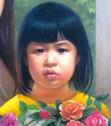Introductory Note: On July 15-16, 2004, an art exhibition sponsored by the Falun Dafa Association of Washington, D.C. with the theme of "Uncompromising Courage," was held in the exhibition hall of Rayburn House Office Building in Washington, D.C. Falun Gong practitioners created all the art works in the exhibits. Some of the artists are still illegally imprisoned in China. After five years of bloody suppression, these Falun Gong artists hope to express the joy of returning to one’s true nature through cultivating Falun Gong, their indestructible righteous beliefs under cruel tortures and suppression, their persistence in pursuing Truthfulness-Compassion-Forbearance, and their faith in “justice will defeat evil eventually.” These artists each have their merits. They have tried to use the traditional methods to achieve their goals. We will continue to introduce the works of these artists, the ideas behind their works and their creation processes.
 |
| Oil painting "I Want Daddy" by Wang Weixing (24 x 30 in.), 2004 |
Reporter: Zhu, Qingming, reporter for PureInsight Net
Wang: Ms. Wang, Weixing, painter
Reporter: You have a painting "I Want Daddy" which is about Dai Zhizhen and her daughter's story. Could you tell us a little about the composition of this painting?
Wang: "I Want Daddy" is an extremely simple feeling for a child. She lost her father, but naturally she wishes to see him again. Regarding the composition, because the child is very small, if she were at a very low position relative to her mother, the composition would be pulled very long and the top part would be very difficult to manipulate. Therefore I needed to place the child in a slightly elevated position. You can assume that the child is standing on the steps not far from her mother. Her mother is, thus, just a little bit higher than her. The right side has a door straight up to the top. Between the mother's head and the top is an empty space. Overall, the left and right sides of the painting are higher than its middle part, but I am not willing to use the letter "V" or something like that to analyse the composition. Instead, I prefer to analyse it conceptually. I tried to arrange the composition so that it looks pretty comfortable and makes it easy for me to express my idea.
With respect to big paintings, I should say that I am no longer attached to painting big paintings as I was before. In the past, it was in my mind that only the big paintings were allowed to express big things. Actually it is not true. Many paintings that were very attractive to me, were not so due to their sizes, but rather due to their profound connotations. Therefore, I think of “big” and “small” differently than before. I started to express my ideas deeply in small paintings.
The focal points of this painting are primarily the girl’s eyes. Whenever the colours of the mother's or the father’s face became prominent, I just redrew them. In fact, the quality of this painting is determined mainly by how you manipulate it. If I had drawn the mother and father with a lot of details, the audience wouldn’t be able to see the little girl's eyes at first glance. Many times I had to white out places, including the little girl's body, and draw them again. So drawing a picture takes a lot of post-processing. You need to consider carefully how to express and how to process, which will take you a great deal of effort and time.
Reporter: It is true that we were caught by the little girl’s eyes at first glance when we came up to see this painting, then we saw her face. Finally, we saw the mother and the father. This painting creates a huge impression on the audience.
Wang: This painting has gone through a lot of post-processing.
 |
Reporter: Many famous western paintings have very exquisite rendering of the characters’ eyes and faces. The eyes are normally the focal points of people’s sight. Well-drawn eyes can “talk”, as in this painting.
Wang: The child’s eyebrow is wrinkled. I felt it should be a little wrinkled, demonstrating that her innermost feelings are not calm. Her mouth is slightly open. When I painted before, seeking beauty, I would draw very pretty mouths. But here is expressed a real child whose father has died, and that is why I have her mouth slightly open and her eyebrow wrinkled.
The story behind the painting "I Want Daddy":
This work was created to illustrate the story of Fadu, a little girl. Fadu’s father died when she was only nine months old. Fadu likes playing a game of making phone calls to look for daddy. She asks some questions on the phone, tells her father her personal thoughts and answers the questions herself. Sometimes she cries for daddy when she’s sad. Her daddy, Chen Chengyong, was persecuted to death in China because he was a Falun Dafa practitioner. After his death, Fadu’s mother, Australian citizen Dai Zhizhen, has taken her to several dozens of countries around the world, appealing to people to help stop these atrocities.
* * *
You are welcome to print and circulate all articles published on Clearharmony and their content, but please quote the source.










 more ...
more ...